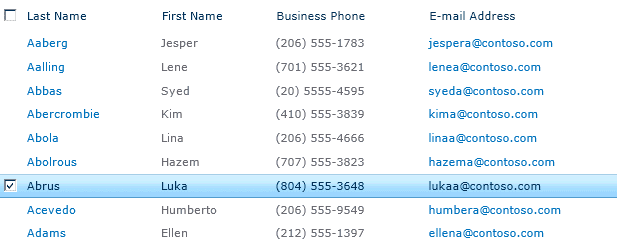12/21/2012
Date:
3:44:00 AM
Posted By
SharePoint
SharePoint User Profiles Service Application has a lot of nice and very useful features but it misses one small but important thing. Customers often want to display all their contacts (from User Profile Store) in a single list, phonebook style.
Here is a simple solution how to achieve this with a PowerShell script. The script queries the User Profile store and then copies user profile information to a simple SharePoint list (based on Contacts list template). The final result might look like this:

Please note:
- If your company has more than 1000 employees this solution might not scale properly.
- The script below was designed for English based SharePoint site templates, additional modifications might be required for other languages.
- The script must be executed under user that has both read privileges to User Profile Service Application and contribute privileges for your site.
Configuration steps:
- On your intranet/team site create a list based on the Contacts list template
- Create an additional column in this list: UserName – Single line of text
Here is the script:
02 | if((Get-PSSnapin | Where {$_.Name -eq "Microsoft.SharePoint.PowerShell"}) -eq $null) { |
03 | Add-PSSnapin Microsoft.SharePoint.PowerShell; |
05 | function Enumerate-SPUserProfiles($webUrl, $listName) |
07 | $x= [System.Reflection.Assembly]::LoadWithPartialName("Microsoft.SharePoint") |
08 | $x= [System.Reflection.Assembly]::LoadWithPartialName("microsoft.sharepoint.portal") |
09 | $x= [System.Reflection.Assembly]::LoadWithPartialName("Microsoft.Office.Server") |
10 | $x= [System.Reflection.Assembly]::LoadWithPartialName("System.Web") |
12 | $context = [Microsoft.Office.Server.ServerContext]::GetContext($sites[0]) |
13 | $profileManager = new-object Microsoft.Office.Server.UserProfiles.UserProfileManager($context) |
14 | $web = Get-SPWeb $webUrl |
15 | $list = $web.Lists[$listName] |
17 | $profileManager.GetEnumerator() | ?{$_.DisplayName -notlike '*\*' -and $_.ProfileType -eq "User" } | foreach-object { Update-PhoneBook $_ $web $list $webUrl } | |
19 | function Update-PhoneBook($user, $web, $list, $webUrl) |
21 | if($user.Item("FirstName") -ne "" -and $user.Item("FirstName") -ne $null) |
23 | $spQuery = new-object Microsoft.SharePoint.SPQuery |
24 | $userName = $user.Item("UserName") |
25 | $camlQuery = "<Where><Eq><FieldRef Name='UserName' /><Value Type='Text'>$userName</Value></Eq></Where>"; |
26 | $spQuery.Query = $camlQuery |
28 | $spListItemCollection = $list.GetItems($spQuery) |
29 | $domain = (gwmi WIN32_ComputerSystem).Domain |
30 | if($spListItemCollection.Count -ge 1) |
32 | Write-Host "Updating $username..." |
33 | Update-Contact $spListItemCollection[0] $user $domain $webUrl |
37 | Write-Host "Adding $username..." |
38 | $contact = $list.items.add(); |
39 | Update-Contact $contact $user $domain $webUrl |
43 | function Update-Contact($contact, $user, $domain, $webUrl) |
45 | $lastName = $user.Item("LastName"); |
46 | $contact["Title"] = "$lastName"; |
47 | $firstName = $user.Item("FirstName"); |
48 | $contact["FirstName"] = "$firstName"; |
49 | $workEmail = $user.Item("WorkEmail"); |
50 | $contact["Email"] = "$workEmail"; |
51 | $workPhone = $user.Item("WorkPhone"); |
52 | $contact["WorkPhone"] = "$workPhone"; |
53 | $CellPhone = $user.Item("CellPhone"); |
54 | $contact["CellPhone"] = "$cellPhone"; |
55 | $office = $user.Item("Office"); |
56 | $contact["Office"] = "$office"; |
57 | $department = $user.Item("Department"); |
58 | $contact["Department"] = "$department"; |
59 | $userName = $user.Item("UserName"); |
60 | $contact["UserName"] = "$userName"; |
You can run it by typing:
Tags
